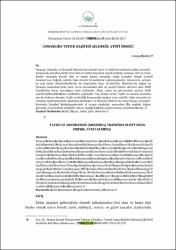| dc.contributor.author | Kara, Osman | |
| dc.date.accessioned | 2022-05-11T14:34:35Z | |
| dc.date.available | 2022-05-11T14:34:35Z | |
| dc.date.issued | 2017 | |
| dc.identifier.issn | 2148-0494 | |
| dc.identifier.issn | 2148-0494 | |
| dc.identifier.uri | https://app.trdizin.gov.tr/makale/TWpZNE1qQTBOQT09 | |
| dc.identifier.uri | https://hdl.handle.net/20.500.11776/7989 | |
| dc.description.abstract | Amasya; Selçuklu ve Osmanlı Dönemi'nin önemli idari ve kültürel merkezlerinden birisidir. Amasya'da kurulan medreseler ilim ve kültür hayatına büyük katkılar sunmuş, dini ve fenni ilimler alanında birçok ilim ve sanat adamı yetişmiş, başta İstanbul olmak üzere Anadolu'nun değişik şehirlerinde önemli hizmetlerde bulunmuşlardır. Amasya'da yetişen bu çok yönlü âlimlerden birisi de Hayreddin Hızır el-Atûfî'dir. Merzifon'da doğan ve Amasya medreselerinde ders veren hocalardan dini ve pozitif ilimler dersleri alan Atûfî İstanbul'da Saray hocalığına tayin edilmiştir. Daha sonra bu görevinden ayrılan Atûfî camilerde vaaz ve tefsir sohbetleri yapmıştır. Tıp, kelam, tefsir, hadîs ve mantık alanında eserler kaleme almıştır. Hadîs şerhciliği konusunda meşhur olan müellif, tefsir alanında da Osmanlı medreselerinde okutulan Zemahşerî ve Beyzâvî tefsirlerine birer hâşiye yazmıştır. Eserlerin İstanbul kütüphanelerinde el yazma nüshaları mevcuttur. Bu makale hâşiye geleneği çerçevesinde müellifin tefsire yaptığı katkıları analiz etmeyi hedeflemektedir | en_US |
| dc.description.abstract | Amasya is one the most important administrative and cultural centers of the Ottoman and Seljuk periods. Madrasas establihed in Amasya had contributed much to scientific and cultural life, and many scholars and artists had been educated in the positive and religious fields, and they had submitted important contributions in the different cities -mainly Istanbul- of Anatolia. Atufi is one of those all-round scholars educated in Amasya. He, who was born in Merzifon, and took coursess about religious and positive sciences from the scholars who gave lectures in the Mamasya madrasas, had been assigned as an intructor to the Palaca in Istanbul. Then quitting that position, Atufi began to give preaches and exegesis talks in various mosques. He produced works on medicine, kalam (theology), tafsir (exegesis), hadith and logic fields. As an eminent author at hadith commentary, he also wrote annotations on both the Zamahshari and Beyzavi exegeses which were taught at the Ottoman madrasas as well. At libraries in Istanbul, copies of manuscripts are available. This article aims to analyze his contribution to exegesis within the farmework and the tradition of comment and annotation | en_US |
| dc.language.iso | tur | en_US |
| dc.rights | info:eu-repo/semantics/openAccess | en_US |
| dc.subject | Sanat | en_US |
| dc.subject | Tarih | en_US |
| dc.title | Osmanlıda Tefsir Haşiyesi Geleneği: Atûfî Örneği | en_US |
| dc.title.alternative | Tafsir Of Annonation (Khashiya) Tradition in Ottoman Empire: Atufi Example | en_US |
| dc.type | article | en_US |
| dc.relation.ispartof | Dergiabant | en_US |
| dc.department | Fakülteler, İlahiyat Fakültesi, Temel İslam Bilimleri Bölümü | en_US |
| dc.identifier.volume | 5 | en_US |
| dc.identifier.issue | 9 | en_US |
| dc.identifier.startpage | 41 | en_US |
| dc.identifier.endpage | 65 | en_US |
| dc.institutionauthor | Kara, Osman | |
| dc.identifier.trdizinid | TWpZNE1qQTBOQT09 | en_US |



















